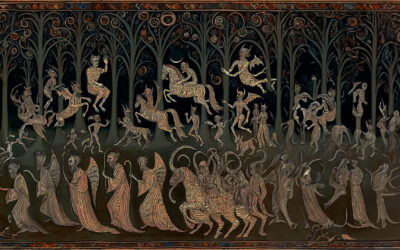Contents
Short introduction to the legends of Alexander the Great
Alexander the Great was subject to an enormous amount of myth-building surrounding his life and his persona. According to one legend, for instance, Alexander was actually the son of Zeus (and therefore a god himself); according to another, he untied the Gordian knot. According to another legend, Alexander wanted to see the world from above and thus had two large birds harnessed with a seat for himself in between them and had them fly up into the sky. And yet another legend claims that his sister was a mermaid. The stories are plentiful.
The Great Alexander
Alexander the third of Macedon, or Alexander the Great, reigned over the kingdom of Macedon from 336 B.C., when he was twenty years old, until his death in 323 B.C.
Alexander spent most of his reign away from his kingdom, aiming instead to expand it through campaigns in Asia and Africa. This was largely successful and the “great” comes from his success as a military commander as he never lost a battle and managed to create one of the largest empires in history.
The Legendary Alexander
Alexander became a legend, a myth in his own time. He was depicted as a hero and, at times, as a god. His life and deeds quickly turned into the stuff of legend, and it might be that Alexander himself encouraged this.
Legends are scattered about, you can find them with Roman authors, with 17th century scholars, in poems, in Norse sagas and so on and so forth.
One of the most famous collections of Alexander legends is the so-called Alexander Romance, a large number of texts merged into one. This collection appeared in the first centuries after Alexander’s death and was first rumored to have been written by Alexander’s own historian Callisthenes. The Greek text was then added to, revised, and during antiquity and the Middle Ages. It’s been translated and used as the basis for the spread of Alexander myths.
The legends of Alexander have also been the foundation of other stories. Small nuggets that might not be as grand as the idea of someone being the son of Zeus, but that make up for it in ingenuity and curiousness.
In today’s book club, we will read four of these short stories about Alexander the Great, stories that might or might not have a grain of truth in them – who knows.
You will find the Latin texts below the video.
Video in Latin: De Alexandro Magno
Story #1: Alexander bibit
(Gasparis Shotti, Mirabilia naturae et artis)
Cum Alexander Magnus aliquandō pōculum bicongium expetīsset, bibēnsque Proteam Macedonem et pōtātiōnibus assuētum prōvocāsset, ille accēpit atque, cum rēgem plūribus verbīs laudāsset, ita bibit ut eī ab omnibus applauderētur. Posteā vērō, exiguō tempore interpositō, idem pōculum expetīvit Proteās, rūrsusque bibit rēgem prōvocāns. Quod capiēns Alexander, ēgregiē quidem bibit, nōn tamen potuit ferre, sed pōculō ex manibus dēmissō in pulvīnar dēcubuit.
Story #2: Equus Alexandri
(Aulus Gellius, Noctes Atticae)
Equus Alexandrī rēgis et capite et nōmine “Bucephalās” fuit. Ēmptum Charēs scrīpsit talentīs tredecim et rēgī Philippō dōnātum; hoc autem aeris nostrī summa est sēstertia trecenta duodecim. Super hōc equō dignum memoriā vīsum [est], quod, ubi ōrnātus erat armātusque ad proelium, haud umquam īnscendī sēsē ab aliō nisi ab rēge passus sit. Id etiam dē istō equō memorātum est, quod, cum īnsidēns in eō Alexander bellō Indicō et facinora faciēns fortia in hostium cuneum nōn satis sibi prōvidēns inmīsisset, coniectīsque undique in Alexandrum tēlīs, vulneribus altīs in cervīce atque in latere equus perfossus esset, moribundus tamen ac prope iam exsanguis ē mediīs hostibus rēgem vīvācissimō cursū rettulit atque, ubi eum extrā tēla extulerat, īlicō concidit et dominī iam superstitis sēcūrus quasi cum sēnsūs hūmānī sōlāciō animam exspīrāvit. Tum rēx Alexander partā eius bellī victōriā oppidum in īsdem locīs condidit idque ob equī honōrēs “Būcephalōn” appellāvit.
Story #3: De Alexandro Magno et Asino
(Claudius Aeliānus, Varia Historia)
Alexander sorte monitus erat, ut eum, quī sibi portā ēgressō prīmus occurrisset, interficī iubēret; asinārium igitur forte ante omnēs obviam factum ad mortem dūcī iussit. Quaerente illō, cūr sē innocentem capitālī suppliciō afficeret, rēx ad excūsandum factum suum ōrāculī praeceptum rettulit. Tum asinārius: “Sī ita est”, inquit, “alium sors huic mortī dēstināvit; nam asellus, quem ego ante mē agēbam, prior tibi occurrit.” Quō callidō dictō dēlectātus asināriō Alexander pepercit, asinum vērō occīdī iussit.
Story #4: Alexander et Apelles
Apellēs, pictor suae aetātis clārissimus, Alexandrum equitantem pīnxerat. Quam imāginem cum rēx minus laudāret, quam meruerat artifex, equus Alexandrī intereā adductus pictō equō sīc adhinnīvit, quasi vērus esset equus. Tum Apellēs: “Ō rēx” inquit, “equus tuus pictūrae perītior quam tū vidētur esse.”
















